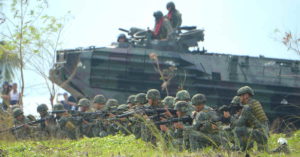AS far as the recent visit of Sen. Risa Hontiveros to Taiwan is concerned, it was a no-no. President Corazon Aquino’s Executive Order 313, s. 1987 signed on Dec. 17, 1987, prohibits government officials from visiting Taiwan or even receiving calls from visiting Taiwanese officials. Some of the salient provisions of the EO are as follows:
– “Whereas, under the terms of the joint communiqué dated 9 June 1975, the Government of the Republic of the Philippines and the Government of the People’s Republic of China exchanged mutual recognition;
– “Whereas, under the same joint communiqué, the Government of the Republic of the Philippines recognized the Government of the People’s Republic of China as the sole legal government of China and that there is but one China, and that Taiwan is an integral part of Chinese territory;
– “Whereas, any official dealing with Taiwan on the part of the Philippines would be contrary to the one China policy and the agreement with the Government of the People’s Republic of China;
– “Whereas, it was the understanding that people-to-people relations between the Philippines and Taiwan may continue, such commercial, economic, cultural, and other unofficial contacts;
– “Whereas, unofficial contacts between the Philippines and Taiwan are facilitated by private offices — the Philippines’ Asian Exchange Center Inc. in Taipei and Taiwan’s Pacific Economic and Cultural Center in Manila — whose operations are tolerated by the People’s Republic of China, provided that they maintain their non-governmental image and are not accorded diplomatic or formal consular status;
– “Whereas, even private visits to Taiwan by high-ranking Philippine government officials assume an official character since they are perceived as representatives of the Philippine Government, and their visits are publicized and draw public attention;
– “Whereas, visits of Philippine government officials to Taiwan and calls of visiting Taiwanese officials on Philippine government officials are perceived by the People’s Republic of China as violations of the one-China policy and the terms of the joint communiqué;”
Hence, the visit to Taiwan of Senator Hontiveros, first and foremost, was irresponsible and reckless. It was not only a provocative action coming from a Philippine government official, a senator of the republic for that matter, vis-à-vis China concerning the Taiwan question, but then again, in many respects, it was a complete disrespect of EO 313. It was also a complete disregard of the prevailing norms and standards in international relations of countries, most notably concerning the One China policy
The One China policy is a prevailing consensus among the international community and a basic norm in international relations affirmed by Resolution 2758 of the UN General Assembly. The principle fundamentally contends that there is only one China in the world, and Taiwan is an inalienable part of China’s territory. The One China principle clearly states that there is only one sovereign state under the name China, with the People’s Republic of China (PRC) serving as the sole legitimate government of that China, and Taiwan is a part of China.
The One China principle is one of the basic norms governing international relations and one of the bedrocks of international law.
The Taiwan question is at the heart of China’s core interests and is the most important red line that must not be crossed. As far as the Chinese are concerned, it is non-negotiable and a bottom line that countries like the Philippines should not cross. In short, the Taiwan question is not an issue that countries like the Philippines should not play fire with precisely because this is really an enormously serious issue as far as the Chinese are concerned.
Moreover, as far as the Chinese and broader international community are concerned, Taiwan’s reunification with mainland China and Taiwan being part of the territorial integrity and sovereignty of China is a fact and an essential component of the post-WW2 international order as stipulated in the Cairo Declaration and the Potsdam Proclamation.
Strategic ambiguity
On the other hand, the US attempts to play the “Taiwan” card to the extent that Uncle Sam is leveraging and capitalizing on the Taiwan issue to contain China is a dangerous game that the Philippines should take caution and must not be involved with at all costs.
The current series of US moves trying to maintain a permanent “peaceful division” between the two sides of the Taiwan Strait, instigating tensions and crisis in the Taiwan Strait, exemplified by the continuous push for the expanded EDCA in the Philippines and attempting to bring NATO into the Asia-Pacific region are perilous and risky moves on the part of the US that threatens the peace and stability of the Asean region and the wider Asia-Pacific region. This is a dangerous situation that countries like the Philippines and the world at large must not allow to escalate and accelerate.
Asean is intended to be non-aligned. The Philippines’ closer relationship with the US jeopardizes this objective. Marcos’ “leaning on one superpower” foreign policy harms the relationship between the Philippines and other Asean members, as it further pits the US and China against each other, adding to the polarization.
Moreover, when it comes to US foreign policy, it is pretty problematic in the sense that the US says one thing and does another. They have this deliberate practice of strategic ambiguity, also known as a policy of strategic uncertainty of being intentionally ambiguous on specific aspects of US foreign policy that suit their geostrategic and hegemonic interests at the expense of another country. I hope the Philippines will never follow or adopt this foreign policy line.
On the part of the Philippines, it is a positive note that, as a country, we adhere to the One China principle, which is one of the foundations of our bilateral relations with China. Hence, in a strict manner, we should treat the Taiwan question as an internal affair of China. We should not get involved or meddle in the Taiwan issue. To do otherwise would mean we are interfering in China’s sovereign internal affairs, which will generate a further backlash on our relations with China.
Conclusion
The recent visit of Senator Hontiveros to Taiwan as a government official of the country is no doubt a disrespect and disregard for the principles of mutual respect for sovereignty and territorial integrity and non-interference in each country’s internal affairs; a breach of the norms of international relations/law and interference in China’s internal affairs.
Our government officials and the current administration must take note of the fact that the One China principle is recognized by the United Nations and by 181 countries, including the United States. While Taiwan’s so-called “independence” is recognized by less than two dozen countries across the globe.
Source: The Manila Times
https://www.manilatimes.net/2023/05/18/opinion/columns/is-ph-playing-fire-on-the-taiwan-question/1891969



